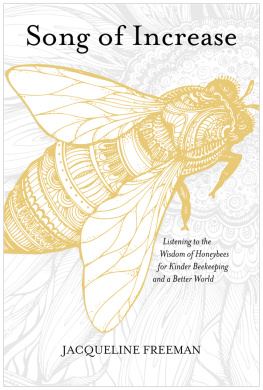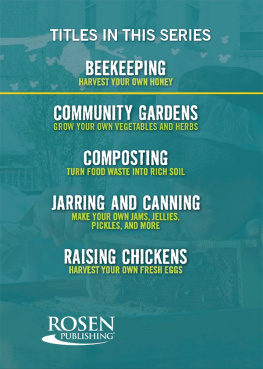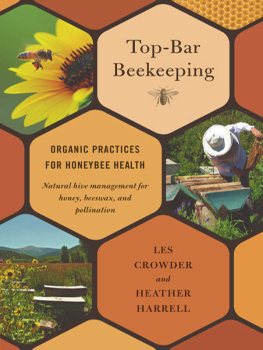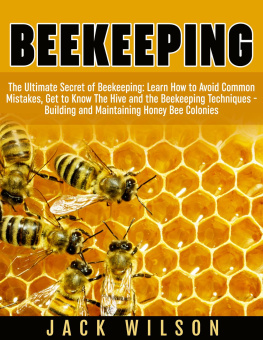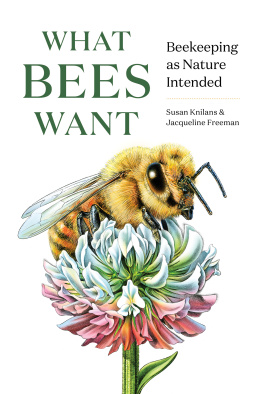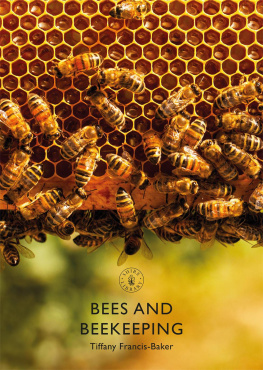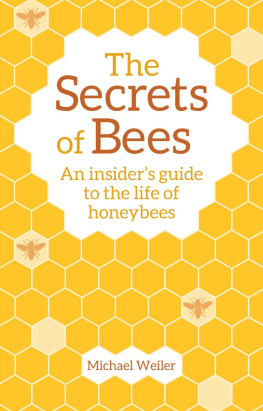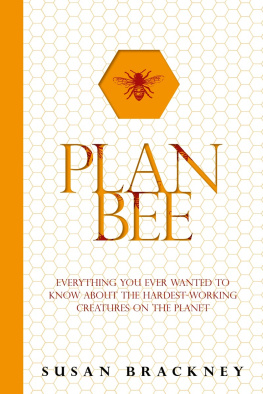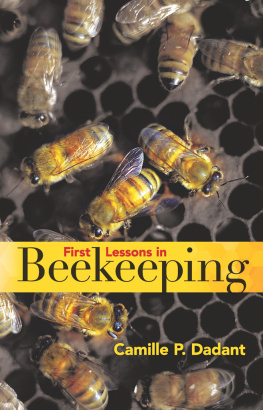
To Joseph, for his ongoing love for, belief in, and support of all my ventures. I thank God every day for bringing us to this marriage and partnering you and me in this sovereign life. Bless you, my beloved husband.
When we step into the world of Apis mellifera, we are entering a multidimensional landscape of being. The life gesture of the honeybees is so unique and different from most other life forms that a rational mind alone cannot provide sufficient understanding of its nature. Although they are one of the most studied animals, questions about their lives remain. Rudolf Steiner described the bees in his lectures as a world-enigma. It points toward an understanding that goes beyond reason, and it is an invitation into another mode of awareness.
MICHAEL JOSHIN THIELE
Contents
Foreword
I met Jacqueline Freeman several years ago, when I attended her workshop on the spiritual life of the honeybee. My only experience with bees up to that point in my life had been a sting on the ear from a honeybee when I was six years old. I swelled up like the Michelin Tire Man and kept a healthy distance from bees after that. But on a chance whim or perhaps in answer to the dream whisper of that little bee from so long ago I signed up for Jacquelines bee workshop on her farm.
It was no ordinary class, and Jacqueline is no ordinary beekeeper.
Jacqueline was teaching the class with fellow beekeeper Michael Joshin Thiele, both members of a small and growing cadre of bee enthusiasts who practice an entirely new kind of beekeeping. Called bee-centric, natural beekeeping, or bee guardianship, these revolutionary beekeeping methods emphasize the needs of the bee over the keepers desire for honey production.
The high point of the class came when we stood before the entrance of a large and active honeybee hive. We were directed to open our arms and send the bees kindness and goodwill. Within seconds, bees poured from the door of the hive, circling us in gentle humming spirals. I stood silent, fearless, and ecstatic in a swirl of bees that circled my body and all our bodies with curiosity and aerial grace. Their hypnotic, thrumming song vibrated deep in my chest long after the bees had departed back to the privacy of their hive.
When I opened my eyes, I saw that I was not the only one with tears streaming down my face. From that day, I have loved bees. I love them with a childs delight and with a mothers fierce desire to protect her family. The bees are our family. We are bound to them and they to us through the grand and terrible process of domestication. They are part of our history and our lives, and our dependence on them is far greater now than their dependence on us. We are tied to them by necessity, for our food survival. The tie that binds them to us is immense generosity.
Jacqueline Freeman is a biodynamic farmer, beekeeper, and artist. She is also a gifted intuitive, as the women in her family line have been for generations. Jacqueline has been receiving messages and images from bees for several years now, and what the bees have told her is being revealed bit by tiny bit in scientific studies on the quantum nature of bees, their medicine, their communication, and their organizational structure as a superorganism. This is pretty heady stuff and unconventional to the point of baffling at times, but what Jacqueline has experienced with her bees feels true to me down to my very bones.
This book is a compilation of information from the bees themselves and from Jacquelines experience with her many hives. I must tell you, this book is full of the word love. Love is, Ill admit, an often-overused word. But should you doubt that this word is the least bit excessive in her use of it, I can assure you it is not. Jacqueline is a woman who lives and breathes this word into each and every relationship on her enchanted farm of bees, blossoms, cows, goats, cats, dog, fish, and chickens.
I know this because I have spent many days and nights there while putting this book together. Jacqueline is ceaselessly attentive and loving to whatever creature plant or animal crosses her path. In the evenings I find her gathering up lost bees into screen-topped jars, offering them a dab of honey and a familiar piece of honeycomb to rest on for the night. Writing halts for a moment when her cat Remy requests her attention, which she readily shares. Weeding the garden, shell stop to sort cow and goat leafy treats from compostable weeds and twigs. When the borage plant falls over in the heat, she sends me running for a stake and tie to keep it lifted to the sun. Each evening before bed, she and Joseph bless each animal and their farm.
This is a woman whose words I believe when she shares the bees message of unity, food made with prayer, and work done with great love. The bees chose the right medium for their message. Jacqueline who she is and how she lives is an inspiration to me. She is a woman of confidence, integrity, and great joy; life meets her there in that place, and magic and enchantment unfold around her. This web of goodness she weaves captures all who share her world, from the smallest plant to the most peripheral of associates. She is most assuredly a woman who walks the talk of unity.
Since that time I was enfolded in the spiral of bees, Ive taken many beekeeping classes from Jacqueline and from guest teachers she brings to her farm. Jacqueline and her fellow beekeepers are sparking a revolution in beekeeping around the world, and if the honeybee is to be saved, it is Jacqueline and folks like her who will show us how it will be done.
Sitting near the entrances of my own beehives now, I replay the words, images, and wisdom in these pages over and over again. This is not a book to read once and set aside. Keep it on your night table when you need to know there are forces in nature working diligently and tenderly on your behalf. Reading this precious and enthralling book has made me a more hope-filled person and a far better friend to my bees. My wish is that you, too, may be blessed with the simple grace of bees as you sit with their words and Jacquelines.
Susan Chernak McElroy
Camas, Washington
Introduction
W hen the bees speak, I listen.
Strange as it may sound, I do hear bees talk. In my first few years with bees, questions and novel ideas arose and organized themselves in my thoughts, and I found them interesting and useful. Had this continued, I certainly would have imagined myself as having a good connection with the bees.
Then one day, in a moment of reverie, I received eye-opening information about the role bees play in the world, and a whole new understanding of bees emerged. What they had to say encouraged me to make fundamental changes in how I care for my bees.
One becomes a better beekeeper by letting a bee be a bee. If everything is done in service to that, the life force of the colony grows, and the hive thrives. How can we give bees an environment that allows them to have the most advantageous experience of living in harmony with all their purposes? When we satisfy that question, we will have returned to our sacred partnership with honeybees.
How I Fell in Love with Bees
A friend offered us bees, and it seemed natural to accept, as we did when we were given our first chickens. When our first hives arrived on our farm in early summer 2004, I had no experience with bees. I thought of them as another farm animal one who gave honey instead of milk or eggs.
Like most people, I was quite fearful about getting stung, so I bought a protective bee suit with hat, veil, jacket, pants, and gloves. The first time I put it on, I wore a long-sleeve shirt and jeans underneath to give me a double layer of protection. I pulled on my knee-high farm boots, and I duct-taped the overalls inside the boots so no bees could burrow inside. I taped the edges of my elbow-length gloves over the long sleeves of the jacket. I put on my bee hat and zipped the bottom of the screened veil into the jacket. I even taped the zipper in case a bee might try to get in that tiny opening at the top. Looking like an astronaut suited up for a moonwalk, I marched out to see the bees.
Next page
